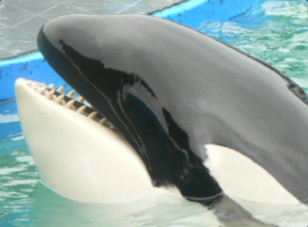 photo credit: The Orca Network
photo credit: The Orca NetworkTokitae at the Miami Seaquarium.
The recent death of an orca whale held in captivity in Florida for more than five decades has invigorated calls to release other marine mammals – including Corky – an orca at San Diego’s SeaWorld.
At the same time, some California lawmakers are pushing federal regulators to demand better care for marine mammals in captivity.
KRCB’s Greta Mart has the story, one personal to her.
The Florida orca, whose stage name was Lolita, was also known as Toki. She was captured in Penn Cove on Whidbey Island in Washington State when she was about three years old.
I grew up hearing her story from my dad, who was then a news cameraman for Seattle station KING-TV.
[Archival whale sounds from 1971 Penn Cove captures]
He filmed another whale capture a year after Toki was taken.
It aired on the evening news and shocked audiences around the region.
Here’s KING-TV reporter Don McGaffin, speaking to the camera in a 1971 news report.
“Whale catchers and oceanariums keep pounding the public relations drum, taking the position that one of the big reasons the killer whale has taken is for scientific reasons,” McGaffin said. “Yet some marine biologists don't know whether to laugh or cry at that suggestion. They point out that what little work is done is actually physiological, aimed at keeping the killer whale alive in a tank which keeps the exhibitor alive at the box office. What isn't known is far more important than what is known. For example, they don't know how many whales there are out there in the Puget Sound. They don't know if they're migratory, whether they live here and die here. They don't know how often they have calves. They don't know the period of gestation of the cows. They don't know the suckling periods of the calves. They just don't know very much about the subject at all. And what they really don't know is whether the whales taken by Griffin and Goldsberry these past seven years–constantly–-are from the same family or from the same pod. Yet the captures go on.”
Half a century later…scientists do know a lot more about these creatures–how they communicate and how far and deep they range.
But a group of US lawmakers says care standards for marine mammals in captivity haven’t been meaningfully updated since the ‘80s, despite plenty of calls for change, especially after the 2013 documentary “Blackfish.”
Earlier this month, the congressional group wrote a letter to federal regulators demanding updates.
Congressman Jared Huffman, who represents Sonoma County and California’s north coast, co-authored the letter.
“Most people understand that these standards are almost willfully obsolete,” Huffman told KRCB News. “They have allowed for decades these highly intelligent, highly social migratory animals to be confined in very cruel and inadequate conditions”.
He said new standards could mean the end of marine mammals in captivity.
“And that's probably why there's been so much foot dragging by USDA all these years, because they don't want to issue a regulation that it's gonna have such a sweeping effect on this industry,” Huffman said.
The US Department of Agriculture, which regulates oceanariums and aquariums via the Animal and Plant Inspection Services, didn’t return KRCB News’ requests for comment.
Meanwhile, plans were far underway to release Toki back to the Pacific Ocean before her death in mid-August.
[audio from Aug. 19, 2023 vigil in Langley, WA]
More than 100 people gathered for her vigil.
“Our work is not done,” said Susan Berta of the Orca Network, addressing the vigil crowd. “We're gonna work harder on her behalf…f or her and her family, because her spirit is still with us, and it's with her family, finally swimming free with them.”
[audio from Aug. 19, 2023 vigil in Langley, WA]
“If I could talk to Toki, I would say, I am so sorry that we didn’t get you home,” Howard Garrett of the Orca Network told KRCB News soon after Toki’s death.
Berta and Garrett spent three decades campaigning to bring Toki home. Their nonprofit is working to end captivity for all marine mammals.
Garrett said advocates around the country are now focusing on getting Corky, the captive orca at SeaWorld San Diego, back to the wild.
“There is a location, and there is funding and a project now to return Corky to her home waters in British Columbia,” Garrett said.
Work, he said, he will now do in Toki’s name.

 Live Radio
Live Radio




